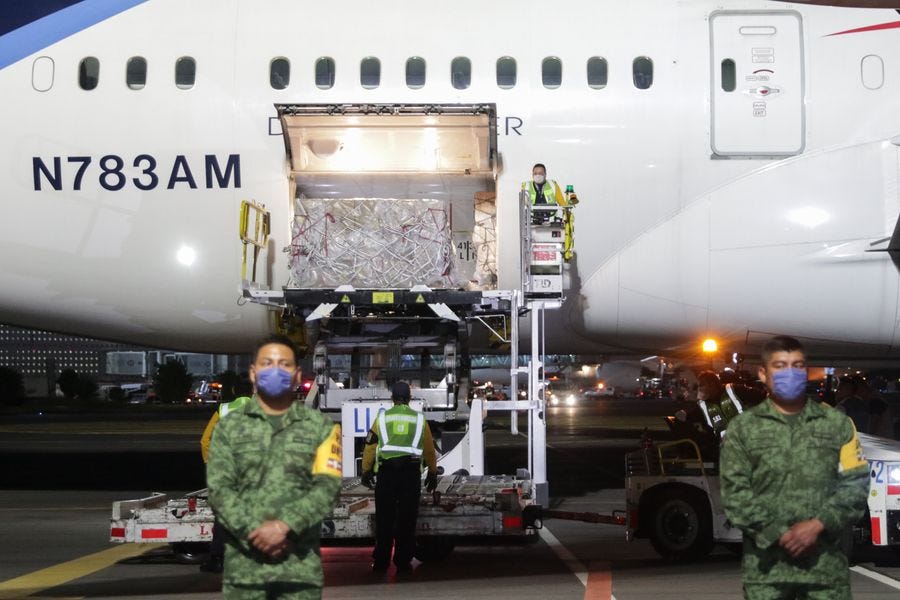
Last week, following a meeting between Latin American and Chinese government officials, a Mexican foreign ministry statement said the following:
“China's Foreign Minister said that the vaccine developed in his country will be a public benefit of universal access, and that his country will designate a loan of $1 billion to support access [to the vaccine] for the nations of the region.”
Depending on how this offer is framed, it may appear to be a significant boost for cooperation between China and Latin America. However, there are risks to both sides as well. China’s offer can also be framed as “you have to pay us a billion dollars to get in line for access to a vaccine, but don’t worry because we’ll loan you the money.”
In the geopolitical competition to be the first country to develop and distribute a coronavirus vaccine, Latin America is a very interested spectator. The vaccine competition is a chance for various countries outside the hemisphere to obtain or renew influence and China senses an opportunity.
The vaccine competition may be a magnified version of the PPE and ventilator problems
There will be a competition among countries in Latin America, Africa and Southeast Asia to obtain vaccines that will allow them to restart their economies. As occurred with personal protective equipment (PPE), there is a fear among Latin American countries that they will be outbid for the initial vaccines and lack access for months after other parts in the world vaccinate their populations. Countries within the hemisphere may find themselves in a competition with each other to obtain limited supplies of vaccines in the first half of 2021.
As Margaret Myers wrote in late May, China has been sending hundreds of shipments to aid, mostly PPE, to countries around the region. There were good reasons to believe that the shipments would generate geopolitical benefits.

Above: Supplies from China being delivered to Mexico. Photo from Xinhua.
Months later, the negative headlines regarding PPE have at times outweighed the positive. Problems with quality and questions about corruption in PPE and ventilator contracts have been particularly pronounced in the equipment arriving from China. Middleman vendors with limited experience have moved into the space, at times increasing prices. The highest profile example occurred in Mexico, where ventilators ordered from China appeared overpriced and delayed.
Those problems could be magnified in vaccine contracts or distribution. If China’s vaccine doesn’t work, is only partially effective, has quality control issues, or has negative side effects, Latin America could face continued coronavirus cases. There will almost certainly be some case of bribery or kickbacks in the contracts to obtain the vaccines. Latin American journalists will report those problems, something China cannot censor the way they do domestically. A well produced and distributed vaccine could be a big boost for China’s cooperation for the region, but mistakes could give China a bad reputation that lasts a generation.
...One billion dollars
[Pretend I inserted a Dr Evil gif here]
Even structured as a loan, the one billion dollar promise just on vaccines is an important number because it rivals the size of US aid packages to the region. The current FY2021 request for assistance to Latin America is $1.4 billion divided up across a number of different initiatives. There is not a current single billion dollar aid package from the US to Latin America, making China’s announcement the most significant the region has seen in some time.
There are at least three issues with this announcement.
First, the fact China still provides aid announcements to Latin America in nice round numbers of US dollars suggests that they are still losing the war over whose currency will be dominant in the near future.
Second, China’s promises for aid, loans and investment have not always come through. At times, Chinese government officials have announced the same investments on multiple occasions, creating an impression that they are investing more than they actually are. This vaccine promise is different in that it isn’t some random infrastructure project. This is a promise to help fix the highest profile problem every country is currently facing. Latin American countries are definitely going to follow up and the risk of China not coming through could create a backlash.
Third, China’s promise is a loan, not a grant or an offer for free vaccines. Most of the developing world is increasingly aware that China’s loans come with significant strings attached, even if they are different than the human rights and economic policy demands of US and IMF assistance. Will Latin American countries that speak out about the abuses against the Uighur population in Xinjiang or in favor of the democracy movement in Hong Kong still be able to obtain that money or a vaccine from China? Probably not.
Thanks for reading
Please let me know if you have questions or comments.


